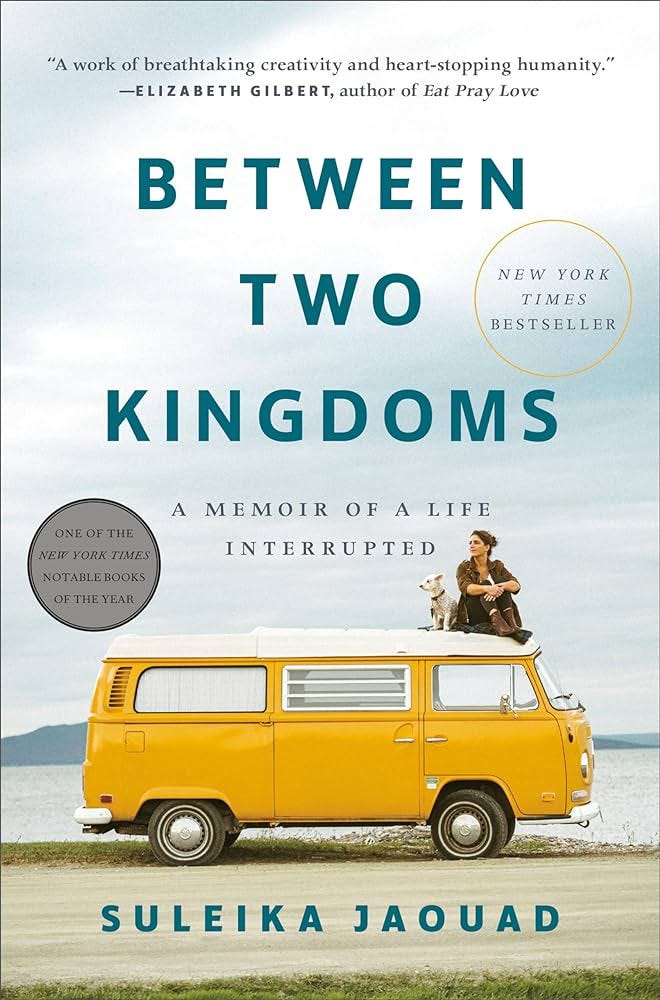I hear the repetitive "hut, hut, hut" of a taekwondo practice at the local dojo. The sounds—which curiously don't stop, not even for a moment's breath—mix with the grumbling of the construction trucks across the street. I'm distracted by these noises as I race to finish Suleika Jaouad's Between Two Kingdoms. Specks of sand and pebble are tucked in the creases between pages, which make me wonder about the previous reader who borrowed the library's only copy before me. I wonder if it accompanied them on vacation, tucked into a tote or towel, and collected the grains of a beach in Florida or the Amalfi coast or Mexico. I had requested the book after watching American Symphony, the stunningly human account of Jon Baptiste and Suleika Jaouad's creative and romantic partnership.
I picked up the memoir a few days ago and unlike its previous owner, didn’t take it much farther from its home, sitting, as I was, just 10 feet from the library’s entrance. I was roughly fifty pages from the end and found myself a comfy lawn chair to finish reading.
I'd vaguely known Suleika's story, having read The Isolation Journals since discovering it in early 2022, though I'd only become a vociferous reader in the last year, nearly a decade after the events of the memoir take place.
Every few sentences or so, an idea finds me and plunks me on the head, its "hut" echoing the martial artists just across the street. The idea soaks into my skull, begging for some ink to color its edges. I grumble a fine at the interruption, knowing that as a writer, this is the life I've chosen: answering every call of creativity, even if (and especially if) it disrupts my peace and quiet. Despite my resistance, I grab my pen and jot down a note before settling back in.
My eyes flit upwards—ripped from the page—when a young girl magically appears on the soft grass to my left, executing a perfect running cartwheel.
It is so graceful, so magical, that I, too, have to execute my own literary cartwheel and write it on the pages of my notebook. I don't want to forget the moment. The black ink draining from my fountain pen ensures that I won't.
Suleika, the author I'm devouring, is no stranger to interruptions. At twenty two years old, after graduating from Princeton University and hurrying to pursue her journalistic ambitions, she is diagnosed with acute myeloid leukemia and given a grim prognosis. Her life—or the life she thought she'd get to live—interrupted. Suleika spends the next four years in survival mode, from a bone marrow transplant to the danger of infection, she is walking the tight rope between two kingdoms: wellness and illness.
As a recent grad myself, I can't help but imagine what that must have been like: on the brink of young adulthood only to be sorely shepherded into a life of hospital beds, rounds of invasive chemotherapy, and mortal dread. Many young people operate under the assumption that we are invincible, unmoored by nagging reminders that death will befall us, too. With the COVID-19 pandemic, our bubble was burst, and although many of us continued to be led by our perceived invincibility, there was a haunting sense—as quiet and chilling as the deserted roads and cities—that something had changed. No longer invincible; we were suddenly vulnerable to a unique threat that emphasized our decidedly vincible selves.
As a freshman in college when the pandemic begun, I reflected, much later, that this time “was a test in the face of panic, one felt personally for many months before reverberating into a world of suffering.” I didn’t know it yet, but this pandemic would prove a sizable interruption to the rest of my undergraduate years. Although I was lucky enough to study abroad and retain some sense of normalcy as a senior, this interruption—big enough to shut down the world—would change things.
I was not infected with COVID-19 until 2022, more than two years after the pandemic began, and it knocked me off my feet for three days. Four years and four iterations of vaccinations later, I’ve managed to evade the infection and remain in the kingdom of the well. It’s much easier to grumble fine and grab my pen here.
And yet Suleika, having crossed that treacherous tightrope from one kingdom to the other, has bravely marked her passage through her work. Although her fine is likely far more complicated and hard-wrought, she repeatedly finds the tools—through journaling, watercoloring, and community—to “transform life’s interruptions into creative grist”.
And for that, I—one among her hundreds of thousands of readers—am grateful.
____
I sit in my lawn chair with my borrowed book—grains of sand spilling onto my lap as I flip the page, cartwheels defying gravity feet away, the repetitive “hut” of exertion—and realize that not only is life far more interruptible than I thought, but that these interruptions are rich with meaning.
And so when Suleika, in her last few pages, writes that she mastered Scrabble in a hospital room, interrupting her other life-threatening interruption, I get up from my lawn chair under the sun, walk ten minutes to the local toy store and buy myself a board. Because, to me, life is never more meaningful than with twenty-six letters.
Until next time,
Kiera





